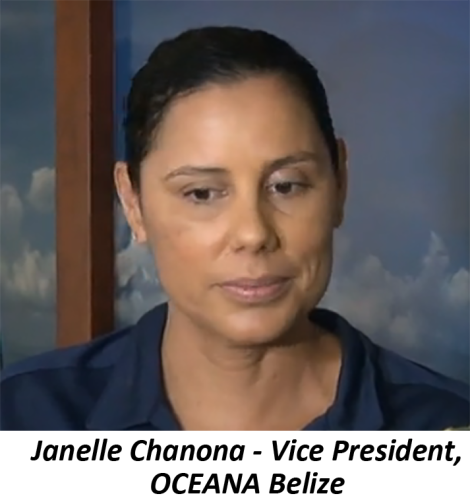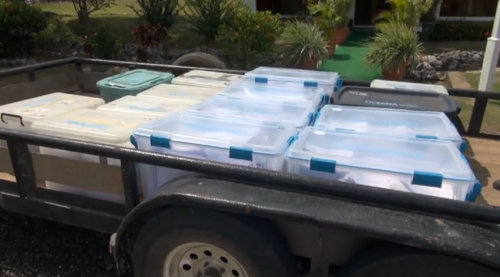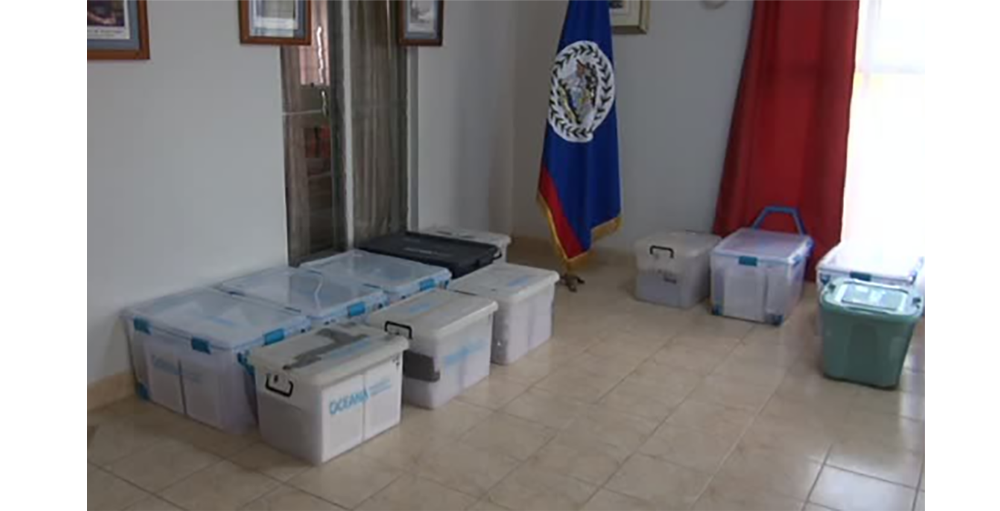Photo: OCEANA Belize delivers to Governor General signed petitions to trigger referendum
BELMOPAN, Thurs. June 22, 2023
Since November 17, 2022, twenty-two thousand plus Belizeans have put their signatures to paper to demand that there be another referendum on the topic of offshore oil exploration. The reams of petitions were loaded onto a trailer and hauled to Government House in Belmopan where they were handed over to the Governor General who is tasked with issuing a writ of referendum if the signatures of 10% of the electorate are confirmed by the Elections and Boundaries Department.
A similar 1st effort of OCEANA Belize in 2012, then under the leadership of Vice President Audrey Matura, ended in disallowed signatures and an unofficial referendum they called the People’s Referendum. Demonstrating overwhelming sentiment against offshore oil exploration, of 29,235 voters who participated in the exercise, 96% said NO and only 4% voted in favour of offshore oil exploration. In 2017, the Government declared a moratorium on offshore oil exploration.

Now, under the leadership of OCEANA Belize Vice President Janelle Chanona, the international marine conservation organization intends to trigger a referendum to require that the Government of Belize consult Belizean voters “before the moratorium on offshore oil and natural gas exploration and petroleum operations is ever lifted.”
The actual question that OCEANA wants posed to voters is, “Do you support a legislative ban by way of an amendment to the Belize Constitution, Chapter 4 of the Laws of Belize, which will prohibit offshore petroleum and natural gas exploration (including but not limited to seismic testing, seismic surveys, multibeam surveys), development, drilling, extraction, production, storage, and disposal within the internal waters, territorial sea, and the exclusive economic zone of Belize (‘petroleum operations’), unless a referendum is held in accordance with the Referendum Act, Chapter 10 of the Laws of Belize, which approves such petroleum operations?”
As Chanona explained in November last year, the reason why OCEANA Belize proceeded with a second referendum effort was because, during a conversation with Prime Minister John Briceño on strengthening the existing moratorium, “he told us he would like to proceed with seismic … I will say, we had an agreement to disagree at that point …” The Prime Minister subsequently accused Chanona of overreacting, and he wrote OCEANA Headquarters saying as much. PM Briceño would subsequently plead his case to the media stating, “the entire discussion with the Vice President of OCEANA was simply saying that I believe that as a country we need to take stock of what we have, and one of the ideas was about whether we should have any kind of seismic testing in the exclusive economic zone – not by the barrier reef. The idea is that if we were to find – if there was anything there – we could leverage our assets. It does not mean that we have to go and do any drilling; it simply means that we can go to the more developed countries, we can go to the big international NGOs to say ‘well, we have this asset; we want to keep it there but help us.’ We have extreme poverty, we have an issue of poverty in this country and we need to address it.” However, OCEANA Belize quietly barrelled ahead with its effort until the required number of signatures was collected.
The number of registered voters as at May 2023 is 95,981. The delivered petitions equal roughly 23% of that figure. According to the Referendum Act, Chapter 10 of the Substantive Laws of Belize, Revised Edition 2020, the petition must be signed by at least 10% of the registered electors in Belize. On the previous occasion in 2012, 8,047 signatures were disallowed. This time around, Chanona says they spent the last 6 months doing their own vetting of signatures, including by calling voters.

Today, Chanona expressed that the collection of the petitions represents that Belizeans want to be a part of the decision-making process on the topic. Asked what instantly galvanizes Belizeans when it comes to our natural resources, Chanona responded, “I think it’s because the connection we have to our resources is so visceral. I mean, who are we if we are not 2nd longest barrier reef in the world? Who are we if we cannot go eat mango in the sea? Who are we if we can’t go catch the fish and eat it at the same time? That is such a part of us.”

